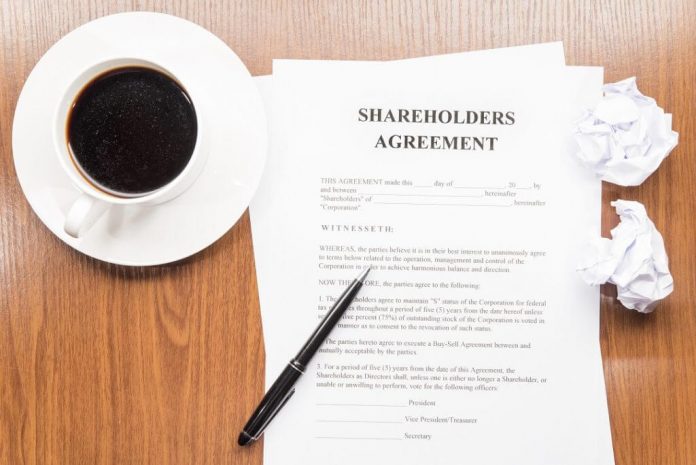This article is written by Srijita Chakraborty, pursuing a Diploma in Advanced Contract Drafting, Negotiation, and Dispute Resolution from LawSikho.
Table of Contents
Introduction
India’s economy is one of the fastest-growing economies and it aims at the integration of global economies. Being the land of start-ups, raising funds is seen as one of the major steps for any business venture and without adequate knowledge or understanding, the same can prove to be a massive roadblock in the whole process. For most start-ups, the usual course of action for finding investors to invest in their ventures is to give them a certain stake in their company in return for the capital investments made by them. This usually leads to them having certain rights as stakeholders and sharing a major chunk of decision-making power with respect to the company. Hence, to formalise this relationship, parties enter into a plethora of agreements one of such being the shareholders agreement.
A company is a legal entity that is majorly governed by the Memorandum of Association (MOA) and the Articles of Association (AOA). While MOA deals with the essential and fundamental details of the establishment of the company, AOA is a document or can also be referred to as a rule book that contains the internal affairs of the company. Both Memorandum of Association and Articles of Association of a company are public documents and are available in the public domain. Whereas on the other hand, a shareholders agreement is a private contract between the shareholders of the company dealing with their rights and obligations with respect to holding and transferring of shares.
This article while explaining the basics of Articles of Association and shareholders agreement tries to provide a clear understanding as to primacy between Articles of Association and shareholders agreement. It focuses on the judicial standpoint to determine which of the two has an upper hand in case of conflicts between the two.
What are Articles of Association?
Articles of Association can be defined as the constitution or a rule book of a company. It states the internal working and the governing of the company. It states the kind of business that has to be undertaken by the company, the responsibility of the members and the directors, the rights of the shareholders and most importantly it includes ways and means by which shareholders can exert control over the Board of Directors. In simple words, it lays down a guideline on what it can or cannot do.
According to Section 2(5) of the Companies Act, 2013 “articles” means the Articles of Association of a company as it was originally framed or as have been altered from time to time or applied in pursuance of any previous company law or of this Act. Companies Act clearly states and make it compulsory that all types of companies that are formed in India under this Act have to have their own AOA and without which a company cannot be legally formed.
What is a shareholder’s agreement?
A shareholders agreement is a private agreement among the shareholders of the company stating their rights and obligations. It also includes provisions related to the management and authorities of the company. It deals with matters such as transfer of shares, forced transfers of shares providing veto to rights, the nomination of directors for representation on boards etc.
Shareholders are the ones who hold less than half of the equity share capital in the company. Hence the main objective of the shareholders agreement is to protect the interests of the shareholders.
But to make the company liable to the terms and conditions mentioned in the shareholders agreement, it is necessary that it is in compliance with the Articles of Association of the company.
Relationship between the shareholders agreement and Articles of Association
The ageless query of the corporate world as to which of the two prevails in case of a conflict seems to be never-ending though there have been judicial interventions through multiple cases still, there’s no definite answer to the same. There have been different views that have been upheld by the Indian Judiciary and it’s important to look into them in order to reach the right conclusion.
-
AOA has an upper hand over shareholders agreement
AOA is often referred to as the heart of a corporate entity. Hence, it has an upper hand over the shareholders agreement. The clauses of the shareholders agreement have to be in consonance with the clauses of AOA. And in case it’s not, then in that case it’s the AOA that has an upper hand.
In VB Rangaraj vs. VB Gopalkrishna, the Supreme Court while opposing the High Court’s judgement held that shareholders agreement cannot have an upper hand over AOA and hence can’t go beyond the clauses of AOA. The Supreme Court observed that the provisions of a shareholders agreement inflicting restrictions, although is in consonance with the Companies Act, can be authorised only when they are in consonance with the AOA as well.
The above decision was relied upon by various courts in a number of cases which followed thereafter, such as:
The Bombay High Court in the case of IL&FS Trust Co. Ltd. vs. Birla Perucchini Ltd held that the Supreme Court’s decision would not be just limited to just conflict in the transfer of shares but instead, it would be applicable in respect of any conflicts between AOA and Shareholders agreement.
In World Phone India (P.) Ltd. vs. WPI Group Inc., USA it was observed by the Delhi High Court that “The legal position is that where the articles of association are silent on the existence of an affirmative vote, it will not be possible to hold that a clause in an agreement between shareholders would be binding without being incorporated in the articles of association. The question to be asked is whether the provisions of an agreement, that are not inconsistent with the Act, but are also not part of the articles of association, can be said to be applicable. Section 9 of the Companies Act only states that the clauses in the agreement that is “repugnant” to the Act shall be “void”. This does not mean that the clauses in the agreement which are not repugnant to the Act would be enforceable, notwithstanding that they are not incorporated in the articles of association.”
-
Provisions of SHA were upheld
Certain recent developments show that various courts have deviated from the judgement held in VB Rangraj’s case and have held that shareholders agreement does not become unenforceable just because they haven’t been incorporated in the AOA of the company. Although they haven’t clearly mentioned the judicial view on provisions of shareholders agreement that haven’t been mentioned in the articles of the company and there still persists a sense of ambiguity in this aspect, it doesn’t automatically make the agreement unenforceable.
In Premier Hockey Development Private Ltd vs. Indian Hockey Federation PHDPL and IHF had entered into a Shareholders agreement and IHF was violating the agreement by organizing a hockey league in 2011. And due to this PHDPL filed a petition. The IHF contended that the board of Directors had not fulfilled the quorum requirements mentioned in clause 10. 3.2 and 10.3.3 of the shareholders agreement while initiating the resolution to file the petition against IHF. But both of these clauses of the Shareholders Agreement were not incorporated into the Articles of Association of PHDPL. To this, the Hon’ble court held that although the above-mentioned clauses weren’t included in the shareholders agreement, it did not violate any of the terms of the AOA of PHDPL nor the Companies Act 1956. And therefore, the provisions of the Shareholders agreement were clearly binding on the company.
In the case of Vodafone International Holdings BV vs. Union of India, the Supreme Court opined that the shareholders and the company can enter into any agreement as long as they are not in contravention with the Indian Contract Act. Further, it was held that the provisions of the Shareholders agreement that are not included in the AOA can be enforceable if they are not in violation of the Indian Contract Acts.
Critical analysis
In the light of the cases discussed above, we can summarise that the debate over the conflict of the shareholders agreement and Articles of Association has always existed.. But it has been legally established in VB Rangaraj’s case that the Articles of Association have an upper hand over the shareholders agreement i.e. The provisions of the Shareholders agreement have to be in consonance with that of the Articles of Association. But, in case there is no express provision in the Articles of Association then the stand drawn in the Vodafone case is that the Shareholders agreement is valid and the parties can get remedy under the Contract Act and not the Companies Act.
It is noteworthy to mention here that the recent development and inclusion of the proviso under Section 58(2) of the Companies Act 2013 which states as follows: “any contract or arrangement between two or more persons in respect to the transfer of securities shall be enforceable as a contract“ has cleared the cloud of ambiguity with respect to the enforceability of provisions concerning the transfer of securities incorporated in an SHA when the same are not incorporated in the AOA.
This development has been followed after the Bombay High Court’s judgement in the case of Messer Holdings Limited vs. Shyam Madanmohan Ruia & Others where it was clearly held that any contract between two or more parties with respect to the transfer of securities can be enforced like any other contract and doesn’t hinder the free transferability of shares.
Conclusion
There have been genuine efforts made to uphold the sanctity of the Shareholders agreement but AOA being the constitution of any company, it becomes more important than the provisions of the shareholders agreement are in compliance with the articles of the company. But post adding of the proviso under Section 58(2) of the Companies Act it’s clear that there are developments being made to bring both of these legal documents at the same footing but until and unless there’s a definite Supreme Court Judgement being laid down in this issue the ambiguity would still persist. Hence, looking at the present scenario, one can conclude that it is imminent to include the provisions of the shareholders agreement in the articles of the company to ensure its enforceability.
References
- https://www.mondaq.com/india/shareholders/1001432/articles-of-association-v-shareholders-agreement-the-conundrum
- https://www.linkedin.com/pulse/enforceability-sha-provisions-incorporated-articles-company-hamid/
- https://www.mondaq.com/india/shareholders/624970/aoa-over-sha-overriding-powers
- https://www.mondaq.com/india/shareholders/603222/is-restriction-on-transfer-of-shares-valid-under-companies-act-2013
Students of Lawsikho courses regularly produce writing assignments and work on practical exercises as a part of their coursework and develop themselves in real-life practical skills.
LawSikho has created a telegram group for exchanging legal knowledge, referrals, and various opportunities. You can click on this link and join:
 Serato DJ Crack 2025Serato DJ PRO Crack
Serato DJ Crack 2025Serato DJ PRO Crack











 Allow notifications
Allow notifications


